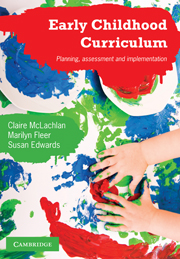Book contents
- Frontmatter
- Contents
- List of figures
- List of tables
- About the authors
- Acknowledgments
- Chapter 1 Introduction
- Chapter 2 Theory, research and the early childhood curriculum
- Chapter 3 Development and learning – how views of development shape how curriculum is framed
- Chapter 4 Curriculum as a cultural broker
- Chapter 5 Interpreting early childhood curriculum
- Chapter 6 Cultural-historical curriculum in action
- Chapter 7 Curriculum as a conceptual tool: Observation, content and programming
- Chapter 8 Assessing children and evaluating curriculum: Shifting lenses
- Chapter 9 Content knowledge: The sciences, maths and numeracy
- Chapter 10 Content knowledge: Language, literacy and ICT
- Chapter 11 Content knowledge: The arts and health, wellbeing and physical activity
- Chapter 12 Conclusions
- Index
Chapter 9 - Content knowledge: The sciences, maths and numeracy
- Frontmatter
- Contents
- List of figures
- List of tables
- About the authors
- Acknowledgments
- Chapter 1 Introduction
- Chapter 2 Theory, research and the early childhood curriculum
- Chapter 3 Development and learning – how views of development shape how curriculum is framed
- Chapter 4 Curriculum as a cultural broker
- Chapter 5 Interpreting early childhood curriculum
- Chapter 6 Cultural-historical curriculum in action
- Chapter 7 Curriculum as a conceptual tool: Observation, content and programming
- Chapter 8 Assessing children and evaluating curriculum: Shifting lenses
- Chapter 9 Content knowledge: The sciences, maths and numeracy
- Chapter 10 Content knowledge: Language, literacy and ICT
- Chapter 11 Content knowledge: The arts and health, wellbeing and physical activity
- Chapter 12 Conclusions
- Index
Summary
In this chapter the theory and the practice of Vygotsky's (1987) work on concept formation will be introduced. This work is important for framing approaches to building content knowledge in mathematics and science in the context of the environment. This is an important part of the early childhood curriculum that can sometimes get lost in play-based approaches. In this chapter, a model for understanding how concept formation occurs in relation to children's everyday experiences of the world and their acquisition of formal knowledge will be examined. The model is explained using examples from practice which show how children and teachers can work together to build conceptual knowledge within play-based approaches to curriculum.
MATHEMATICAL CONCEPT FORMATION WITHIN EVERYDAY PRACTICE
It is 10.00 am and Jacinta and her teacher are wiping the tables in preparation for morning tea. Jacinta's teacher has recently attended a workshop on curriculum planning and has brought back a series of cards which give suggestions for how everyday practices can be used to promote mathematics education in young children. As she wipes the table she recalls the dialogue on the back of the cards (see Figure 9.3) and says:
Teacher: Jacinta, see if you can move the cloth all the way to the edge of the table.
Jacinta: Like this (moving the cloth across the table surface, running her hand along the edge).
Teacher: Yes, that's it. We are wiping the whole area of the table – right to the edge. […]
- Type
- Chapter
- Information
- Early Childhood CurriculumPlanning, Assessment, and Implementation, pp. 157 - 175Publisher: Cambridge University PressPrint publication year: 2010



